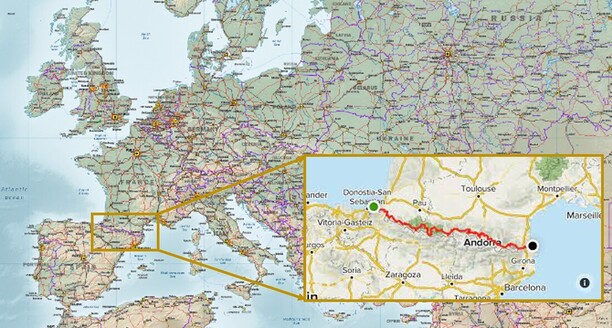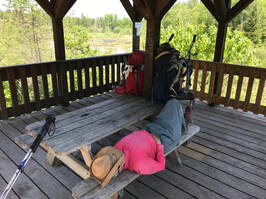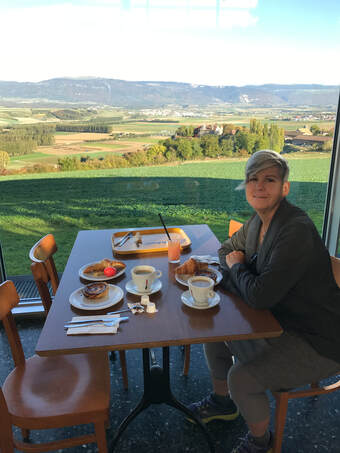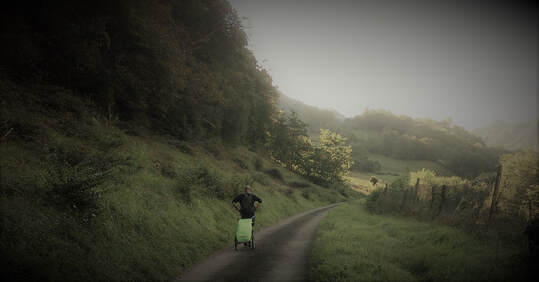We all lead busy multifaceted lives. Our many responsibilities eat up our time. Often the road toward a dream adventure trek seems so convoluted that it may, at first, appear impossible to accomplish.
Thru-hikes require lots of planning and that demands a certain amount of discipline to see them through to a successful end. You may need to negotiate with your loved ones on sharing more of the household responsibilities or forgo participating in some groups or activities to create more time for training, saving money, and/or learning technical skills.
Change is not easy, but we believe it is worth it. Keep in mind that embracing change means to accept the good and the bad during the process. You, and your family members, may resist this process. A thru-hiker concept worth remembering is to ‘embrace the suck’. Change, like bad weather, is inevitable. With the right attitude, putting up with ‘the suck’ can be a Zen thing; you do what you must because you want to achieve your goal!
Thru-hikes require lots of planning and that demands a certain amount of discipline to see them through to a successful end. You may need to negotiate with your loved ones on sharing more of the household responsibilities or forgo participating in some groups or activities to create more time for training, saving money, and/or learning technical skills.
Change is not easy, but we believe it is worth it. Keep in mind that embracing change means to accept the good and the bad during the process. You, and your family members, may resist this process. A thru-hiker concept worth remembering is to ‘embrace the suck’. Change, like bad weather, is inevitable. With the right attitude, putting up with ‘the suck’ can be a Zen thing; you do what you must because you want to achieve your goal!
The following are general concepts regarding overcoming obstacles.
Identify potential obstacles - As you start researching your trek, keep track of the potential pit falls you may encounter. Check your assumptions. Are they based on facts? Don’t be afraid to challenge your ideas before letting them be a show stopper.
Brainstorm with someone. How can you adjust your mindset and schedule to create more time for the planning process? Manage your resources; time, energy, money, and action can be redirected toward your trek. A well-established plan takes time. Set aside time and resources in your life to achieve this goal. Set priorities and stick to them.
Identify potential obstacles - As you start researching your trek, keep track of the potential pit falls you may encounter. Check your assumptions. Are they based on facts? Don’t be afraid to challenge your ideas before letting them be a show stopper.
Brainstorm with someone. How can you adjust your mindset and schedule to create more time for the planning process? Manage your resources; time, energy, money, and action can be redirected toward your trek. A well-established plan takes time. Set aside time and resources in your life to achieve this goal. Set priorities and stick to them.
|
Training for our first trek, I wondered if I had the stamina to accomplish it. Self doubt crept in, and I worried that I would let Simon down. I started focussing on just making it through each day. I surprised myself by becoming much stronger than I could have ever imagined. I now consider myself an athlete capable of accomplishing amazing feats!
|
Seek advice - Seeing how others have achieved their goals can be enlightening. Check out blogs on preparing for a thru-hike. These may provide answers to your situation. Ask for help from your family and friends. They may be able to assist in remarkable ways.
Remember why - Thinking about the end-result can keep you motivated. Your trek will be amazing. All this effort will be worth it. By keeping track of the milestones as you check off each item from your list, you will be able to see the progress.
Enjoy the journey - Planning is part of the journey! By immersing yourself in research and all-things-thru-hike related you may learn a great deal about yourself and this wonderful sport.
Remember why - Thinking about the end-result can keep you motivated. Your trek will be amazing. All this effort will be worth it. By keeping track of the milestones as you check off each item from your list, you will be able to see the progress.
Enjoy the journey - Planning is part of the journey! By immersing yourself in research and all-things-thru-hike related you may learn a great deal about yourself and this wonderful sport.
Time Commitment – Life is busy and any change to a routine demands some re-evaluation of daily activities. The question is, where will you find the time to train and prepare?
- Reduce time sappers. TV, and social media platforms can use up a lot of your free time. By reducing, or eliminating them from your day, you will gain back hours in which to focus on your prep.
- Get up an hour earlier. This extra time is perfect for a good work out.
- Use breaktime at work for errands or a quick workout.
- Getting fit, saving money, and learning new skills for your trek may take a bit of time. Create a realistic schedule and stick to it.
- Negotiate the time away with your employer, and your family. Your employer may agree for you to work a few extra hours each week to bank more holiday time. Simon negotiated 2 multi-month sabbaticals from his employer (without pay). Managing family responsibilities can be a bit more challenging. But if your loved ones see how important this is for you, and you promise something in return, they may help you achieve your goal.
|
We met Bill on one of our trails. He had trained and planned his trek but had forgotten, or not thought it important, to negotiate his time away from his family. Being a local of the area, he needed to get off trail several times to deal with family responsibilities. He eventually stopped his trek as it became clear he would not have time to finish the journey in the time he had.
|
Health & Fitness – You need to start by understanding your overall health condition and physical fitness level. Starting too fast, not dealing with a lingering injury, or overlooking a pre-existing condition is only asking for trouble. Get a health check to establish a baseline.
- Create a fitness plan that builds strength and endurance. If you lack knowledge, hire a fitness trainer. Consider this trek a competitive event and aim to peak just before starting on your adventure. By progressively increasing your workouts your body will be ready for the demands of the trip.
- Take care of minor injuries before they become major ones. Incorporate rest days, stretching, and massage to help your body recuperate. Seek professional help to strengthen weak areas.
- Making sure your pack and footwear are properly fitted will reduce potential nerve impingements, blisters, and other painful conditions on the trail.
- Look into proper nutritional recommendations to build a great health base and provide your body with what it needs.
- If your trip is in a foreign country, you may need inoculations. These can take a bit of time to schedule; plan ahead.
Finance – It may be obvious but there are financial impacts of these types of trips.
- Your household bills need to be paid while you are away. Take the time to save up for those expenses. Can you sub-let your apartment? Are there some utilities that can be cancelled while you are away? Will you engage a house/pet sitter?
- If the trek is abroad, you will have transportation costs such as airfare, trains, or buses. You may have to pay for lodging, or campsites along the way. Cost can vary significantly in other countries.
|
We were on the Le-Puy-en-Velay Camino in France and took a few days off to go and see our nephew compete in a circus competition in Switzerland. We offered to buy breakfast for him at a roadway stop. The cost of 3 coffees, some danishes, and sausages was over 70 Euros ($100). Yikes!
|
- On Camino style treks camping may be discouraged. Staying at hostels (communal or private) will be less expensive than chambres d’hôtes establishments, but they are less private.
- Guided treks come with certain fees such as guide, and porter salaries. Make sure you know if an end-of-trip tip is expected.
- Permits, park passes, and visas may add up quickly.
We decided to walk the Great Divide Trail in Alberta and BC in 2022. The trail crossed many national and provincial parks. Reservations for camping needed to be purchased as well as park annual passes. The total cost for camping for this trek was over $500 for the 2 of us.
Skills - Depending on the style of trek you plan, there may be some technical skills that you’ll need to know/learn.
- Learning to walk efficiently will minimize repetitive strain injuries. Check our suggestions on proper walking form on our Health and Fitness section.
- Wilderness camping techniques and leave-no-trace ethics will smooth out many minor frustrations on a thru-hike. Take advantage of camping orientations at your local outdoor store or go camping with an experienced hiker for a week-end. Read and research the best practices.
- Wilderness first aid courses are a must. They offer the basic first aid information with the added challenges of being in the wild. This knowledge is invaluable for treatment of minor injuries such as blisters to major events such as bone fractures.
- Some wilderness treks may require navigation and orientation skills, glacier travel, rock scrambling, and even canoeing. Consider learning some of the basics before you head out. This way you will enjoy the adventure more safely.
- If your trek will be in a foreign country, learning some of the language may come in handy. Being able to exchange with locals, asking for directions, or ordering a meal in a foreign language adds a cultural component to the trip.
On the Camino Frances, Simon got bitten by flees and had an allergic reaction. We were able to stop at a pharmacy and talk to the pharmacist and get advice on how to treat it.
|
Persona - Your current roles in life will be impacted. Shifting some of your time away from your responsibilities and focusing on training and planning will mean that others will have to step up and take charge.
Sharing meal prep, cleaning your house, gardening, child/pet/or elderly parent care can be shared with other members of your family. In this way they get to help you achieve your goals and feel like a valuable part of the team. Negotiating and planning how to transfer your work responsibilities to co-workers during your absence will decrease the impact on your employer and clients. |
I hired a locum massage therapist for my practice. It took a bit of convincing for some clients, but in the end, they enjoyed having a different professional treat them for a short while. Simon informed his clients long before our departure date of his absence and minimised his role on their projects during that time. He delegated his responsibilities to a few of his co-workers. They dealt with any emergencies during our trek. He also volunteered to do the same for them during their holidays.
We believe that, barring some exceptional circumstances, anyone can extricate themselves from their lives for a few months. The planning and preparations for your trek will make your time away more enjoyable and less stressful.
Next step is 'Equipment'




